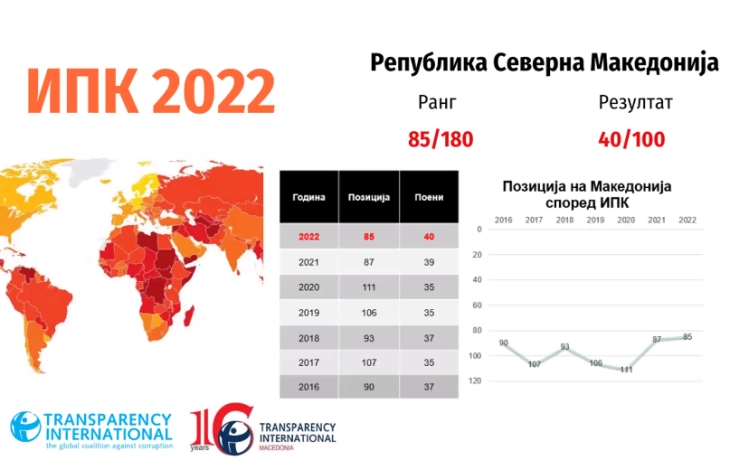Taseva: Still very low in CPI, despite 20 years of talk about systemic fight against corruption
- The Republic of North Macedonia has scored 40 points and ranks 85th out of 180 countries in Transparency International’s Corruption Perceptions Index (CPI) 2022.

Skopje, 31 January 2023 (MIA) – The Republic of North Macedonia has scored 40 points and ranks 85th out of 180 countries in Transparency International’s Corruption Perceptions Index (CPI) 2022.
According to President of Transparency International Macedonia, Slagjana Taseva, the result is worrying and only slightly improved because the country still ranks very low despite 20 years of talk about a systemic fight against corruption.
“The situation with corruption has not improved and we cannot draw a conclusion that a single point makes a better ranking than last year, or that we have achieved any significant result or step forward in the fight against corruption,” said Taseva.
The country’s rating comes as a result of seven surveys. Taseva pointed out that for most of them there is no change in the result.
“There’s a drop in the global democracy project, i.e. a drop of three index points, as well as the global justice project, where we have a decrease of one index point. It is completely consistent with the fact that the results are going backwards due to insufficient democracy and insufficient rule of law,” Taseva said.
The score, according to Taseva, does not differ much from previous years and shows a lack of integrity and respect for laws as well as a decline in democratic processes.
“Our country saw major corruption scandals in 2022. The judiciary and the rule of law were overshadowed by new scandalous features. Even worse, these cases remain unsolved which further reduced citizens’ trust in the judiciary to only 4 percent,” said Taseva.
Among developments that seriously point to insufficient respect for laws or their application according to the needs of individuals, Taseva also highlighted active time barring of court cases, lack of efficiency in resolving the cases that resulted from the wiretapped conversations, insufficient application of confiscation measures and continued unhindered disposal of illegally acquired property, ignoring the decisions of the anti-corruption commission, enabling execution of prison sentence through change of residence to another penitentiary institution, as well as the scandal of illegal issuance of passports to persons associated with organized criminal groups.
“All these cases are just the tip of the iceberg of corruption and organized crime, which still keep the state at the level of insufficient democracy, a hybrid and trapped state. Insufficient handling of corruption or the absence of will to deal with corruption lead to the backwardness of democracy and the rule of law more than before,” Taseva stressed.
As a general assessment of such ranking, Taseva pointed out that the country has had many examples that the mechanisms that should ensure the rule of law and establish a dam in the fight against corruption do not work at all.
“The government bears great responsibility in terms of how it implements policies, but it also has multiple mechanisms to investigate and establish certain systems of integrity without interfering with the work of judges or public prosecutors. However, any suspicion of possible influence and corruption in making certain decisions can be checked through the institutions of the executive. There is no single answer in terms of a single factor or culprit, but the whole system must be corrected and everyone must have a decision here,” said Taseva.
The Corruption Perception Index ranks 180 countries and territories by their perceived levels of public-sector corruption according to experts and businesspeople. It relies on 13 independent data sources from 12 institutions.
The global average remains unchanged for over a decade at just 43 out of 100. More than two-thirds of countries score below 50, while 26 countries have fallen to their lowest scores yet. Despite concerted efforts and hard-won gains by some, 155 countries have made no significant progress against corruption or have declined since 2012.
The highest average score, as in previous years, is seen with the countries from the region of Western Europe and the EU. This year, Denmark scored 90 points and ranked first.
Other countries with low corruption, according to the CPI, are Finland, New Zealand and Norway.
Of the countries in the region, Slovenia ranked highest (41st), followed by Greece (51st), Montenegro (65th), Bulgaria (72nd), Kosovo (84th), Serbia (101st), and Bosnia and Herzegovina (110th).
The most corrupt countries in the world, according to Transparency International, are Yemen, Libya and North Korea.
Transparency Internatiоnal’s report notes that the region of the Western Balkans is known for its low resistance to organized crime, and countries are slow to deal with this risk, while the responsible institutions still lack adequate resources and independence.
In terms of North Macedonia, the report notes that competent authorities are opening new cases of corruption, but these steps in the right direction are threatened due to ineffective monitoring of current cases and the lack of integrity in the selection of key figures in the judiciary. To ensure accountability and show a real will to fight corruption, the government must adequately resource and allow the independence of the anti-corruption commission and the institutions responsible for investigating corruption and organized crime.







